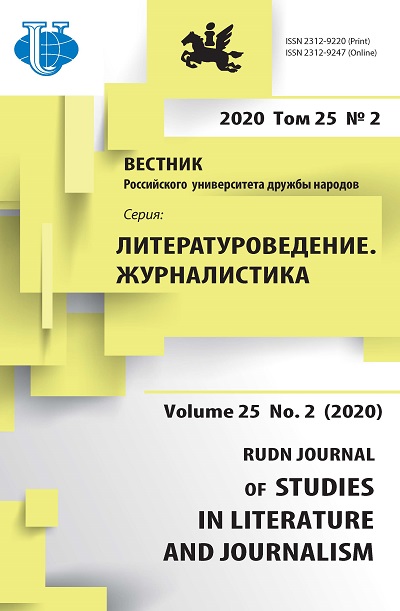Dramaturgy of N. Kurilov in the Yukagir literature system
- Authors: Frolkina D.I.1
-
Affiliations:
- Lomonosov Moscow State University
- Issue: Vol 25, No 2 (2020)
- Pages: 247-257
- Section: LITERARY CRITICISM
- URL: https://journals.rudn.ru/literary-criticism/article/view/24293
- DOI: https://doi.org/10.22363/2312-9220-2020-25-2-247-257
- ID: 24293
Cite item
Full Text
Abstract
The article discusses the plays of the contemporary author N. Kurilov, which raise a number of problems characteristic of Yukagir literature. Poor knowledge of northern literature, the lack of full-fledged research based on materials of modern authors confirm the relevance of this work. The purpose of the article is to analyze the features of N. Kurilov’s plays to determine their place in the Yukagir drama and to identify literary connections with the works of other Yukaghir authors. In his works N. Kurilov continues the traditions of G. Kurilov a children’s writer and playwright as well as G. Dyachkov whose plays highlighted the social and moral problems of the Yukagirs. N. Kurilov considers these problems from a different angle, which is significantly manifested in the spatio-temporal characteristics and in the selection of folklore material. In addition, the author introduces a number of new questions that have not previously been heard in Yukagir drama, a special place in the works is occupied by children and children's education. The playwright thinks about the causes of the disappearance of the people, the gradual loss of language, traditions and religious beliefs. One of the features of the author’s view is the idea that the destruction of an ethnic group occurs among other things through the fault of the Yukagirs themselves who have ceased to preserve their identity. However, the plays express not only bitter regret but also a bright hope for the revival of one of the most ancient Siberian cultures.
About the authors
Daria I. Frolkina
Lomonosov Moscow State University
Author for correspondence.
Email: fdic@mail.ru
Ph.D. student of the Department of History of Modern Russian Literature and Modern Literary Process of the Philological Faculty
1 Leninskie Gory, bldg. 51, Moscow, 119991, Russian FederationReferences
- Zhukova, L.N. (1996). Religiya yukagirov. Yazycheskii panteon [Religion of the Yukagirs. Pagan pantheon]. Yakutsk, Nauka Publ.
- Zhukova, L.N. (2012). Ocherki po yukagirskoi kul'ture [Essays on Yukagir Culture]: in 3 parts. Рart 2: Mifologicheskaya model' mira [Mythological model of the world]. Novosibirsk, Nauka Publ.
- Alekseev, A.N. (1996). Drevnyaya Yakutiya: Neolit i epokha bronzy [Ancient Yakutia: Neolithic and the Bronze Age]. Novosibirsk, IAEt SO RAN Publ.
- Odulok, T. (1987). Zhizn Imteurgina starshego [The life of Imteurgin the Elder]. Yakutsk, Yakutskoe knizhnoe izdatelstvo.
- Ivanov, V.Kh, & Kurilov, N.N. Traditsionnye igry i sostyazaniya yukagirov [Traditional games and competitions of the Yukagirs]. Yakutsk, Severoved Publ.
- Kurilov, N.N. (1999). Leksika sportivnykh igr yukagirov tundry [Vocabulary of sports games of the Yukagirs of the tundra]. Yakutsk, SO RAN Publ.
- Kurilov, N.N. (2007). Oleni na pal'tsakh: P'esy [Deer on the fingers: Plays]. Yakutsk, Bichik Publ.
- Shadrin, V.I. (2014). Transformatsiya etnicheskoi identichnosti yukagirov v sovremennykh usloviyakh [Transformation of the ethnic identity of the Yukagirs in modern conditions]. Gumanitarnye i sotsial'nye nauki [Humanities and Social Sciences], (1), 9–19.
- Iokhel'son, V.I. (1990). Materialy po izucheniyu yukagirskogo yazyka i fol'klora, sobrannye v Kolymskom okruge [Materials on the study of the Yukagir language and folklore collected in the Kolyma district]. Saint Petersburg.
- Kurilov, N.N. (2005). Rebenok ‒ koren' zhizni: etnopedagogika yukagirov tundry [The child is the root of life: ethnopedagogy of the Yukagirs of the tundra]. Yakutsk, Offset Publ.
- Tugolukov, V.A. (1979). Kto vy, yukagiry? [Who are you Yukagirs?]. Moscow, Nauka Publ.
Supplementary files















